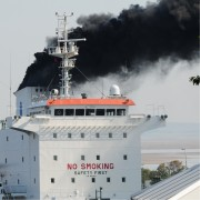Shipping Industry Loses Bid to Keep Polluting California Harbors

Members of the Pacific Merchant Shipping Association will have to abide by California’s 3-year-old vessel fuel rules and stop burning some of the dirtiest, unhealthy motor fuel as they approach the state’s shore after the U.S. Supreme Court declined to hear its appeal of an adverse lower court ruling.
The regulations, which reduce diesel particulate emissions by 74% and sulfur oxides by 80%, cost shippers less than an estimated 1% of the total cost of a trans-Pacific trip About 80% of Californians are exposed to pollution from these vessels and it is expected that the new rule will prevent 3,500 deaths from heart and lung disease over a six-year period. The vessels spew diesel particulate matter daily in an amount equivalent to 150,000 big rig trucks driving 125 miles. Nearly 40% of all U.S. imported goods enter through the ports of Long Beach and Los Angeles, creating devastating health hazards from vessel and trucking diesel fumes.
The merchant association didn’t deny that its members’ fuel was dirty and a health threat; instead it challenged the rules devised by the California Air Resources Board in 2008 as overreach by a state that should have deferred to federal authority. The U.S. Ninth Circuit Court of Appeal seemed open to that argument, but in the end gave more weight to the environmental argument.
“We are clearly dealing with an expansive and even possibly unprecedented state regulatory scheme. However, the severe environmental problems confronting California (especially Southern California) are themselves unusual and even unprecedented,” a three-member panel of the court wrote in their decision.
The turning point in Supreme Court review of the issue may have been reached just days before it decided not to take the case when the U.S. Department of Justice (DOJ) filed its long-awaited legal brief on the Obama Administration’s position. The brief did not take a hard stance on California’s legal reasoning that states can exercise the power of nations under international law to impose conditions of entry into the nation’s ports and internal waters, even if its regulatory standards go well beyond state territory. The DOJ reserved the right of the federal government to exercise its preeminent authority, but recognized the states’ “residual power” to address matters of direct concern to them.
–Ken Broder
To Learn More:
Supreme Court Declines to Hear NRDC California Clean Shipping Fuels Case (by Melissa Lin Perrella, California Progress Report)
PMSA v. CARB Vessel Fuel Rule (by Craig H. Allen Sr., The Maritime Executive op-ed)
Court Affirms California’s Marine Emissions Rules (by Felicity Barringer, New York Times)
- Top Stories
- Controversies
- Where is the Money Going?
- California and the Nation
- Appointments and Resignations
- Unusual News
- Latest News
- California Forbids U.S. Immigration Agents from Pretending to be Police
- California Lawmakers Urged to Strip “Self-Dealing” Tax Board of Its Duties
- Big Oil’s Grip on California
- Santa Cruz Police See Homeland Security Betrayal in Use of Gang Roundup as Cover for Immigration Raid
- Oil Companies Face Deadline to Stop Polluting California Groundwater





